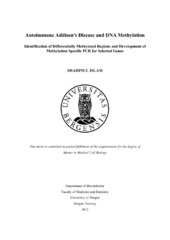Autoimmune Addison's Disease and DNA Methylation. Identification of Differentially Methylated Regions and Development of Methylation Specific PCR for Selected Genes
Master thesis
Permanent lenke
https://hdl.handle.net/1956/5983Utgivelsesdato
2012-07-01Metadata
Vis full innførselSamlinger
Sammendrag
Autoimmune Addison's Disease (AAD) is a classical organ-specific autoimmune disease (AID) that is characterized by autoreactivity towards the adrenal cortex, leading to insufficient production of steroid hormones and death if left untreated. The genetic factors that contribute to AAD development are not well characterized, and it is commonly accepted that epigenetic factors are involved in the onset of AAD, as they are for other autoimmune diseases. This master project was part of a larger project that aims to identify genomic regions that are differentially methylated in AAD patients compared to control individuals through the use of methylated DNA immune precipitation in combination with gene array (MeDIPchip). DNA methylation is a major epigenetic component that is essential for gene expression in embryonic development, normal physiology and disease. Differential methylation status is associated with various pathological conditions, such as cancers and autoimmune diseases. Therefore, precise mapping of the methylome has become a crucial issue to understand gene expression. The MeDIP-chip approach generated a list of genomic regions that are differentially methylated in patients and controls. Some of these regions were analyzed in silico for the position in the corresponding gene and to gain insights of the epigenetic properties of the specific region. The major part of this thesis work involved the development of methylation specific PCR (MSP). This method was developed for the purpose to verify the MeDIP-chip data and to allow screening of large cohorts of both AAD patients and other autoimmune diseases. MSP protocols, in which different primer sets specifically hybridized with either unmethylated or methylated DNA was developed for five genomic regions. Moreover, one region was analyzed by bisulphite sequencing. Bisulphite seqeuncing is widely used to generate single CpG site methylation maps, but it became evident that it is not suitable for methylation analyses of a large quantity of samples. DNA from five patients and five control individuals were analyzed with MSP across a region in the FLCN gene that was found to be hypermethylated in AAD patients in the MeDIP-chip. Interestingly, this differentially methylated region was localized to a CpG-island shore, suggesting regulatory effects of the methylation status. The MSP analysis partly verified a different level of methylation in patients and controls, but the results strongly suggest that quantitative MSP needs to be developed for the genomic regions of interest to be able to distinguish between differences hypo- and hypermethylation. Taken together, the work presented in this master thesis contributed to the identification of genomic regions that are differentially methylated in patients with AAD and healthy controls, and developed methodology that will be an important tool for further evaluation of aberrant methylated regions in patients with autoimmune diseases after some further refinement.
